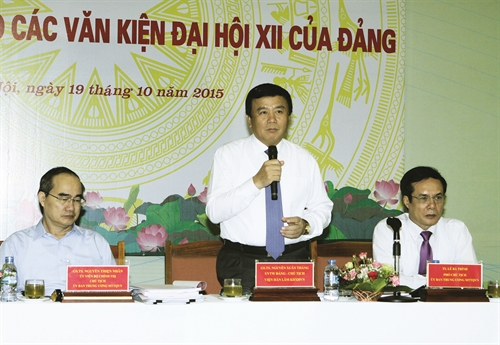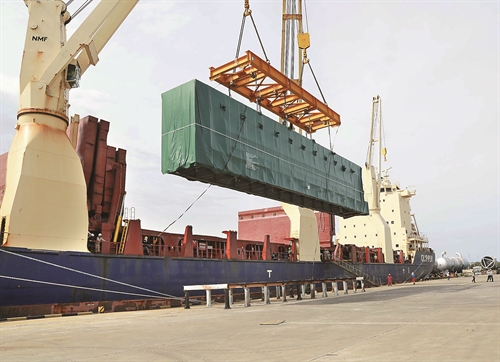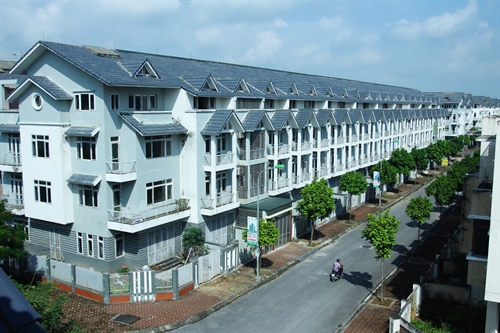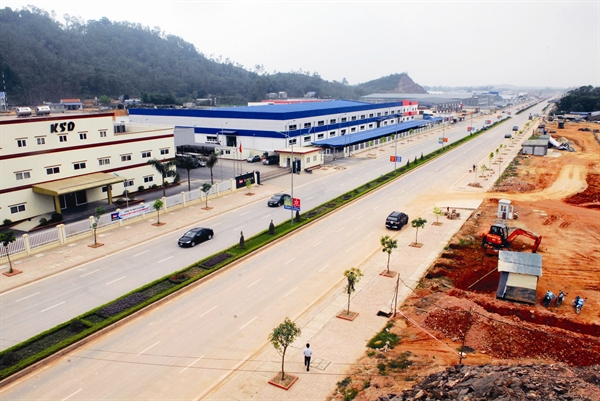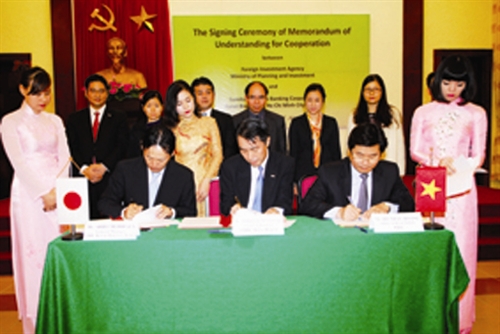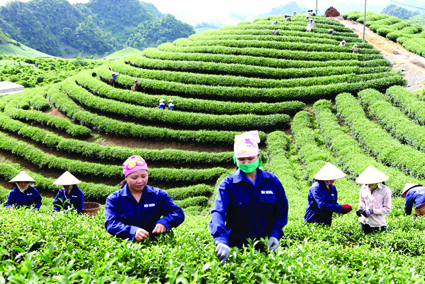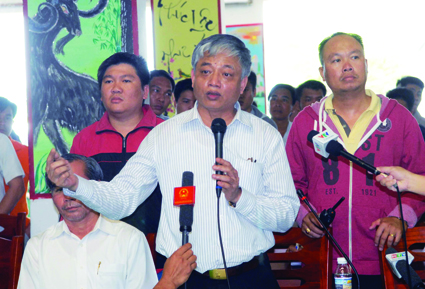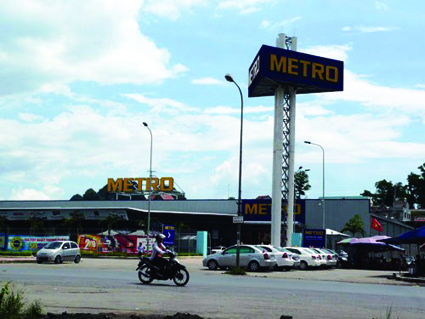>>Vietnam to reach per capita GDP of USD 3,200-3,500 by 2020
>>Building a socialist state ruled by law key to political system reform
In its series of articles on the draft Political Report to be presented at the upcoming 12th National Party Congress, Vietnam Law & Legal Forum this month introduces this article highlighting the draft’s new economic issues, particularly the renewal of economic growth model and improvement of institutions of the socialist-oriented market economy.
>>Building a socialist state ruled by law key to political system reform
In its series of articles on the draft Political Report to be presented at the upcoming 12th National Party Congress, Vietnam Law & Legal Forum this month introduces this article highlighting the draft’s new economic issues, particularly the renewal of economic growth model and improvement of institutions of the socialist-oriented market economy.
DSc Nguyen Van Dang
Former Deputy Director, Central Economic Committee
Renewal of growth model and economic restructuring
Economic growth is the core of economic development. Renewal of the growth model and economic restructuring have been high on the Party’s agenda since its 11th Congress.
The model of extensive economic growth is characterized by increasing GDP thanks to rising mobilization of production inputs such as capital, land, additionally exploited natural resources and worker into production sectors. Extensive growth is limited by the size of input resources while productivity records no or minor increase.
The model of intensive economic growth is based on increasing productivity thanks to trained and skilled workers and application of science and technology. Total-factor productivity (TFP), which accounts for all production elements, is decisive to economic growth. In intensive growth, the level of growth is higher than the total of increases of production inputs as a result of increasing application of scientific and technological advances and business administration knowledge, more efficient use of capital and natural resources, and the worker’s higher skills and qualifications thanks to increasing education and training.
Renewal of the growth model is closely related to economic restructuring. To renew the growth model, the economy should be strongly restructured. To restructure the economy properly and effectively, the growth model should be renewed.
The 11th Party Congress determined that one of its key tasks is “to stabilize the macro economy, renew the economic growth model and restructure the economy to ensure improved quality and efficiency and sustainable development.” It set the policy “to transform the economic growth model from extensive into rationally extensive and intensive one, extension of scale associated with increased quality, efficiency and sustainability. For economic restructuring, the Congress was determined “to restructure the economy, focusing on restructuring of production and service sectors suitable to regions; enhance the restructuring of, and adjust development strategies, for enterprises; and quickly increase the local value, added value and competitiveness of products, enterprises and the entire economy.”
Taking over the outcomes achieved during the tenure of the 11th Party Congress, the draft Political Report to be presented at the 12th Party Congress has more clearly set orientations and solutions for renewal of the growth model and economic restructuring associated with the growth model renewal.
Orientations for renewal of the growth model:
- The growth model in the upcoming time will effectively combine extensive and intensive development, attaching importance to intensive development, raising growth quality and competitiveness on the basis of productivity raising, increasing application of scientific and technological advances, human resource quality improvement, promotion of comparative advantages, proactive integration into the global economy and fast and sustainable development. Short-term and long-term goals and economic growth and cultural development will be harmonized to ensure social progress and equality and environmental friendliness, and improve the people’s material and spiritual lives.
- For growth resources, the growth model will be renewed toward shifting from export- and investment capital-based development to development based on investment capital, export and the domestic market. To promote the key role of internal resources while attracting and effectively using external resources; to fully and properly promote the roles of state enterprises, private enterprises and foreign-invested enterprises and the agricultural production sector.
- The momentum concurrently the condition for renewing the growth model is to enhance the application of scientific and technological advances and innovative renewal in order to raise labor productivity; boost research and development, import state-of-the art technologies; apply advanced management and administration methods; tap human potential and encourage people’s production and business spirit to proactively and fully make use of comparative advantages, increase added value, quickly raise the national value and effectively participate in the global value chain.
Orientations for economic restructuring:
- To further accelerate the uniform and overall restructuring of the economy and sectors and fields associated with renewal of the growth model, focusing on important areas: to restructure investment concentrating on public investment; to restructure the financial market focusing on the system of commercial banks and financial institutions, to step by step restructure the state budget; to restructure and effectively handle bad debts and ensure public debt safety; to restructure state enterprises, focusing on state economic groups and corporations; to restructure agriculture toward raising added value in association with rural economic development and building of a new countryside.
- To continue the synchronous and effective implementation of the overall plan on restructuring of the economy, sectors and fields. Specifically, to restructure agriculture associated with building of a new countryside; to boost industrial restructuring, creating the foundation for industrialization and modernization; to accelerate the development of services; to develop marine industries attached to firm protection of national sovereignty and improvement of the people’s living conditions in sea and island areas; to develop economic regions and zones and increasingly connect regional localities and regions; to boost development of enterprises.
 |
| Harvesting summer-autumn rice crop in Chau Thanh district, Tay Ninh province __Photo: Le Duc Hoanh/VNA |
Improvement of institutions of socialist-oriented market economy
Developing a socialist-oriented market economy constitutes a major content of the Party’s renewal policy. The concept of a socialist-oriented market economy had been increasingly developed and improved from the 6th to 11th Congress of the Party.
The 9th Party Congress asserted that development of a socialist-oriented market economy is the country’s general economic model in its transition to socialism.
The 11th Party Congress introduced in the Platform of national construction in the transition to socialism (which was revised and further developed in 2011) the Party’s view on building a socialist-oriented market economy: “To develop a socialist-oriented market economy with various forms of ownership, multiple economic sectors and different forms of business organization and distribution,” “the state sector plays the leading role. The collective sector is increasingly built up and developed. The state and collective sectors have increasingly become the firm foundation of the national economy,” and “market elements have been created synchronously, types of markets have been step by step built and developed under the rules of a market economy while ensuring the socialist orientation.”
The draft Political Report of the upcoming 12th Party Congress sets orientations for improving institutions and developing a socialist-oriented market economy with remarkably new issues:
- To further unify the concept of the socialist-oriented market economy for long-term orientation throughout the transitional period, which will be further concretized suitable to each development period.
The draft has made a new step of development as it defines specific characteristics of the socialist-oriented market economy: “The socialist-oriented market economy of Vietnam is an economy that operates fully and synchronously according to the rules of a market economy while ensuring the socialist orientation suitable to each period of national development. It is a modern and internationally integrated market economy which is administered by a law-ruled socialist state and led by the Communist Party of Vietnam toward the goal of a rich people and a developed, democratic, equal and civilized country.”
The draft report also generally presents the components and role of the market, roles of the State and the people, and the goal to ensure social progress and equality in developing the socialist-oriented market economy: The socialist-oriented market economy of Vietnam is the one that has advanced production relations corresponding to the development level of production forces; and has various forms of ownership and multiple economic sectors of which the state sector plays the leading role and the private sector is an important driving force of the economy. Stakeholders of different economic sectors are equal, cooperative and competitive under law. The market plays the essential role in effectively mobilizing and distributing resources for development and is the major motive to liberalize the production capacity. Resources are distributed by the State under strategies, master plans and plans in conformity with the market mechanism. The State plays the role of orienting, building and completing economic institutions and creating an environment for fair, transparent and healthy competition; using its resources, instruments and policies to orient and regulate the economy, boost production and business and protect the environment; and ensuring social progress and equality in each development step and policy. The role of the people as masters is promoted in socio-economic development.
The socialist orientation of Vietnam’s market economy has been shown in five aspects, namely administration of the law-ruled socialist state; leadership of the Communist Party of Vietnam; promoted mastery of the people in socio-economic development; determination of appropriate advanced production relations to strongly develop production forces; and particularly guarantee of social progress and equality in each development step and policy.
The idea of “the state sector playing the leading role” has been consistently pursued in the Platform and the Constitution. While the socialist-oriented market economy is determined to have various forms of ownerships and multiple sectors, the leading role of the state sector is asserted. The state sector comprises state resources and state enterprises. State enterprises, like enterprises of other sectors, must operate under the market mechanism and be equal and competitive under law. The draft states: To further boost the restructuring of state enterprises which will concentrate on key and essential fields, important areas and national defense and security; and fields in which other sectors do not invest. State resources (natural resources, land, state budget, national reserve funds, etc.) together with instruments, mechanisms and policies will be used by the State to orient and regulate the economy and ensure social progress and equality. Reality has shown that when state resources and mechanisms and policies focus on a certain field or area, that field or area will be developed. The state sector will thus play the leading role and state enterprises as part of the state sector must operate under the market mechanism and compete equally before law with enterprises of other economic sectors and will be restructured as mentioned above.
Goals to 2020:
To strive by 2020 to basically complete a synchronous system of institutions of the socialist-oriented market economy up to the universal standards of a modern and internationally integrated economy; to ensure uniformity between economic and political institutions and between the State and the market; to ensure harmony between economic growth and cultural and human development, social progress and equality, social security, environmental protection and sustainable social development; to proactively integrate into the global economy associated with building an independent and self-reliant economy; to ensure publicity, transparency and forecasting ability in the formation and implementation of economic institutions, creating stable and favorable conditions for socio-economic development.
To concentrate on completing synchronously modern market economy institutions on the basis of observing all the rules of a market economy and intensive and extensive international integration. To complete the legal framework and mechanisms and policies and uniformly implement solutions for development and smooth and effective operation of types of markets and guarantee of fair and transparent competition. The development of strategies, master plans and plans and distribution of resources for production and business and price management must follow the market mechanism. Concurrently, state resources, regulating instruments, distribution and redistribution polices will be used to ensure social progress and equality, social security, and gradual improvement of social welfare and the people’s material and spiritual life.
- Further improvement of institutions on ownership, development of economic sectors and types of enterprises:
To institutionalize the economic rights (including the rights to own, use, dispose of and benefit from the use of assets) of the State, organizations and individuals prescribed in the 2013 Constitution. The State will protect the people’s lawful ownership under law, ensure transparency in obligations and responsibilities in state administrative procedures and public services for smooth transactions of the economic rights, ensure its right to manage and collect revenues from public assets and the right to equality in access to public assets of all stakeholders in the economy and build capacity of institutions and complete mechanisms for the settlement of civil and economic disputes to protect the economic rights.
All enterprises of economic sectors must operate under the market mechanism, be equal, and compete with one another under law. To adopt policies to develop Vietnamese enterprises into the core and leading force in industrialization and modernization. To ensure the right to freedom of enterprise in the sectors and trades not banned by law; to develop and synchronously and effectively implement the post-inspection mechanism; to further improve the law on competition, to increase transparency in state monopoly and enterprise monopoly, and to control business monopoly. To complete institutions for protection of investors, ownership and economic rights. To complete the law on enterprise bankruptcy under the market mechanism.
State enterprises operating under the market mechanism: To boost equitization and sale of capital the State does not need to hold, including also profit-making enterprises; to improve institutions on land pricing, tangible assets and intangible assets (intellectual property, trade mark, etc.) in equitization according to market rules. To separate production and business tasks from political, public and national defense and security tasks.
To further renew the contents and operation modes of the collective and cooperative sectors: To increase association and cooperation based on benefit-based relations, to apply advanced management methods suitable to the market mechanism. The State will adopt mechanisms and policies to support capital access, human resource training, technology transfer and market development and facilitate the development of the cooperative sector on the basis of developing and promoting the role of household businesses. Improvement of institutions must be accompanied with resolute implementation.
To encourage the development of types of enterprises and forms of organization of production and business of mixed ownership, particularly joint stock companies.
To complete mechanisms and policies to encourage and facilitate the private sector to develop in most industries and fields, becoming an important driving force of the economy. To complete support policies for small- and medium-sized enterprises and start-up businesses. To encourage the formation of multi-owner private economic groups and private capital contribution to state economic groups.
To raise effectiveness in attracting foreign investment, attaching importance to technology transfer, advanced management level and sale outlets; to proactively select and offer incentives for foreign investment projects with advanced technology and management level, effective position in the global value chain and association with domestic enterprises. To increase association between foreign-invested enterprises and domestic enterprises to develop support industries and large-sized and quality industries associated with regional and global value chains.
In the management and development of enterprises of all economic sectors, to promote positive advantages beneficial to the country and concurrently inspect, supervise, ensure publicity and transparency to prevent and control negative practices in accordance with law.
- Synchronous development of market elements and types of markets:
To consistently implement the market price mechanism; to ensure correct and full calculation and publicity and transparency of price constitutes of essential goods and public services; to concurrently adopt appropriate support policies for policy beneficiaries and the poor. Not to incorporate social security elements in prices. To complete the law on charges and fees: To review and switch from applying charges and fees to prices for some public services. To expand mechanisms on bidding, auction and valuation. To complete institutions on protection of consumer rights, and properly and fully promote the role of consumers and consumer protection associations in the economy. To further develop and smoothly operate various types of markets.
- Acceleration and improvement of effectiveness of economic international integration:
To further study, negotiate, sign and prepare conditions for the implementation of new-generation free trade agreements and accession to treaties on economy, trade, investment, etc. To proactively and actively integrate into the global economy; to diversify and multilateralize international economic relations, to avoid dependence on certain markets or partners; to effectively combine internal and external resources associated with building an independent and self-reliant economy.
- Building of the Party’s leadership capacity, increase of effect and effectiveness of socio-economic state management and promotion of the people’s mastery in socio-economic development:
To build the Party’s capacity in working out socio-economic development guidelines and policies; to increasingly direct the institutionalization of lines of the Party and organization of implementation of policies and laws of the State on economic and social issues. To raise the capacity and effectiveness of socio-economic advisory work at different levels and sectors.
The State will institutionalize resolutions of the Party and organize the implementation of policies and laws, ensuring increasing improvement and smooth operation of various types of markets with fair and equal competition and control of business monopoly. To boost administrative reform. To raise effect and effectiveness of the settlement of economic and trade disputes. To refrain from criminalizing economic and civil relations.
To renew and improve mechanisms and policies to promote the mastery of the people; to guarantee the right to freedom and democracy in economic activities of the people under the Constitution and law and effective participation of the Fatherland Front and socio-political organizations in developing and overseeing the implementation of economic institutions and socio-economic development.-
